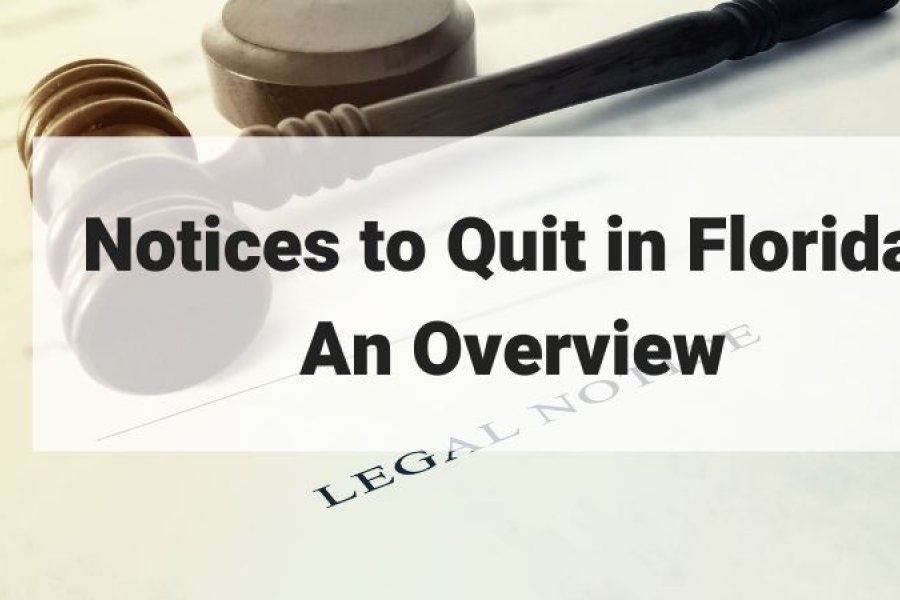
As a landlord, you’ll likely have to evict a tenant at some point during your career. Multiple reasons may lead to this, like nonpayment of rent or violation of the lease agreement.
Florida has an exhaustive eviction process in place and all landlords within the state must follow it and other landlord-tenant laws to successfully legally remove a tenant from their premises.
The first step in the eviction process begins with serving an eviction notice. Eviction notices simply tell the tenant what they have done wrong and what they must do within the notice period to avoid eviction.
There are several kinds of eviction notices in Florida, in this article, we’ll tell you everything you need to know about the Notice to Quit.
Notice to Quit in Florida
In Florida, there are four types of quit notices that a landlord can serve on their tenants:
- 3-Day Notice to Pay or Quit
- 7-Day Notice to Comply or Quit
- Notice to Quit for “At Will’ Tenants
- 30-day Notice to Quit for Rental Foreclosure
Notice to Quit for Non-Payment of Rent
Florida considers rent to be late a day after it is due. If you offer any grace periods, those must be addressed in the lease or rental agreement.
Once rent becomes due, you must provide your tenant with the 3-Day Pay or Quit eviction notice. The notice simply tells the tenant that they have 3 days to either pay any the rent that’s due or move out. You must, however, exclude weekends and legal holidays from this notice period.
In the notice, you must include the following information:
- The amount of rent the tenant owes
- The address of the rental property
- The name of the tenant
- The date the tenant must pay the due rent to avoid an eviction action
- Your name, address, and phone number

Notice to Comply or Quit for Non-Compliance
Two types of noncompliance issues exist in the state of Florida, curable violations and non-curable violations.
Curable violations are violations that the tenant can fix and avoid being evicted.
Non-curable violations, on the other hand, are ones that the landlord can’t fix and the tenant must move out to avoid an eviction.
Examples of curable lease violations include:
- Keeping an unauthorized pet.
- Having unauthorized guests
- Exceeding the rental limit
- Violating parking rules
- Failing to keep the rental unit clean and sanitary
You must provide your tenant with a 7-Day Notice to Comply for committing such violations. This will allows the tenant to fix the violations within 7 days to avoid being evicted. If the tenant doesn’t fix the violations within 7 days, you can file an eviction complaint.
For non-curable violations, you must provide the tenant with a 7-Day Notice to Quit. This will give the tenant a maximum of 7 days to move out of the property or face eviction.
Examples of non-curable lease violations include:
- Ongoing, “unreasonable” disturbances
- Intentional property damage or destruction
- Illegal activity at the rental premises
If the tenant remains on the property after the expiry of the notice period without correcting the issue or moving out, you can proceed to court and begin the legal eviction process.

Notice to Quit for “At Will” Tenants
“At-Will” tenants are those that stay in the rental unit after the expiry of the rental term. As a landlord, you must give them notice before trying to evict them. The type of notice to serve them depends on the type of tenancy:
- For tenants that pay rent weekly, you must serve them a 7 day written notice.
- For tenants that pay monthly, you must provide them with a 15 day written notice.
- For tenants that pay rent quarterly, you must give them a 30 day written notice.
- For tenants who have a yearly tenancy, you are required to provide them with a 60-day written notice.
In the notice, you must state the date by which the tenant must move out of their rented premises.
Notice to Quit for Foreclosure
You can also serve a quit notice to a tenant if your rental property is being foreclosed upon, and the tenancy won’t be continued. In this case, you must serve the tenant with a 30-day written notice to initiate the eviction process.
Again, if the tenant remains on the property after the expiry of the notice period, you can move to court and file for their removal.
Laws to Follow for Serving the Notice to Quit in Florida
You must follow certain regulations when serving an eviction notice in the state of Florida. You must deliver the notice to the tenant using any of the following methods:
- Leave the notice at the rental unit
- Mail the notice to the tenant
- Give the notice to the tenant in person

The Outcome of Serving a Notice to Quit in Florida
Usually, there are two possible outcomes after serving a Notice to Quit in Florida.
- The tenant obeys the notice. For example, they pay all due rent or cure the violation committed within the notice period.
- The tenant disregards the notice. If the tenant disregards the notice and fails to cure the violation or move out, you can move to court and file an eviction complaint. The court will then decide.
Summary:
To have a successful and legal eviction, you must ensure that you’re following Florida’s eviction and landlord-tenant laws.
Consider hiring the services of a qualified property management company like State Property Management to help ensure that you’re complying with all local and state laws.
Disclaimer: This blog isn’t a substitute for expert legal advice from a qualified attorney. Laws change frequently, and this blog might not be updated at the time you read it. Please get in touch with us for any questions you might have regarding this content or any other aspect of your property management needs.